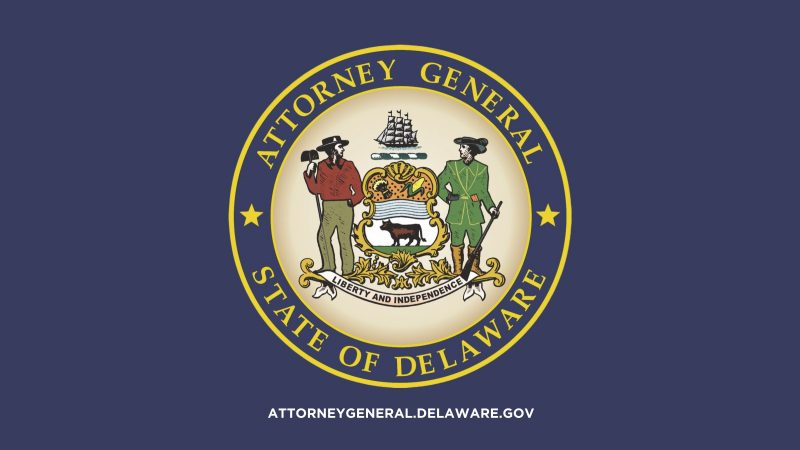
Jennings successfully appealed from original deal, more than doubling Delaware’s recovery with up to $25 million extra
Institutions may remove Sackler name from buildings, scholarships; Sacklers to be banned from opioid business and Purdue to dissolve
Attorney General Jennings announced today a tentative settlement worth as much as $6 billion with Purdue Pharma and the Sackler family over their role in the opioid epidemic. The agreement adds at least $1 billion to a prior bankruptcy plan worth between $4.325 and $4.5 billion. Because Jennings and eight other AGs negotiated for the addition of over $1 billion, Delaware could receive nearly $50 million total from the settlement, all of which will be used to fund opioid treatment and prevention.
“The opioid epidemic has caused immeasurable damage to our state, much of which we can never repay,” said Attorney General Jennings. “The true costs of this crisis have been borne by the thousands of families who have lost friends and loved ones, and the survivors of the epidemic whose lives have been changed forever. Ultimately, those tragedies grew from seeds that were planted years ago by corporate drug dealers and that spiraled out of control in the name of profit.
“Few states have been hit harder by the epidemic than Delaware. We refused earlier deals because they offered fewer resources to our State and would have resulted in less accountability. Those were not always easy decisions, but it was important to me – and to the families impacted by this crisis – that any settlement Delaware participated in was commensurate to the pain and suffering that we have endured. The bottom line is that Delaware’s families deserve the best deal possible. Today’s settlement delivers that, not only through the additional millions of dollars secured for our State, but also through the acceptance of responsibility by the Sacklers, their permanent exile from the industry, and the dismantling of a legacy bought with ill-gotten gains.”
Overdose fatalities in Delaware have eclipsed 400 lives lost annually in recent years, representing the second-worst per capita rate in the nation.
The settlement is conditioned upon approval by the bankruptcy court, on the Second Circuit’s reversal of the District Court’s order, and consummation of the bankruptcy plan. The agreement’s payment schedule could deliver up to $12 million to Delaware in the first 18 months followed by annual payments through 2039.
All funds received by Delaware pursuant to the settlement must be used for purposes of abating the opioid crisis and will be deposited into the statewide Prescription Opioid Settlement Fund and overseen by the Prescription Opioid Settlement Distribution Commission, each created by Senate Bill 166 during the 2021 legislative session.
The settlement keeps intact provisions of the Purdue bankruptcy plan forcing the company to be dissolved or sold by 2024 and banning the Sacklers from the opioid business. The initial bankruptcy plan required Purdue and the Sacklers to make public over 30 million documents. The settlement announced today forces disclosure of additional records previously withheld as privileged legal advice.
Today’s announcement is a civil settlement subject to approval by the court. Neither this agreement nor the prior bankruptcy plan releases the Sacklers from any potential future criminal liability.
Settlement highlights include:
- The Sackler families must pay a total of at least $5.5 billion, with the potential for up to $6 billion. The new deal brings at least $1 billion more than the initial bankruptcy plan, with up to an additional $500 million from the sale of certain international assets. The final payments are spread over 18 years, with larger payments frontloaded so that Delaware will receive more money, sooner as compared to the previous bankruptcy plan.
- The Sackler families have agreed to apologize to victims through a statement of regret for the families’ role in the opioid epidemic.
- The Sackler family must allow institutions to remove the family name from buildings, scholarships, and fellowships.
- Purdue must make public additional documents previously withheld as privileged legal advice, including legal advice regarding advocacy before Congress; the promotion, sale, and distribution of Purdue opioids; structure of the Purdue Compliance Department and its monitoring and abuse deterrence systems; and documents regarding recommendations from McKinsey & Company, Razorfish, and Publicis related to the sale and marketing of opioids.
- Responding to state requests, mediator Judge Shelley C. Chapman urged the Bankruptcy Court to require the Sacklers to participate in a public hearing where victims and their survivors would be given an opportunity to directly address the family.ust
Delaware first filed suit against Purdue in January 2018, alleging that the company and family peddled a series of falsehoods to push patients toward its opioids, reaping massive profits while opioid addiction skyrocketed. On September 9, 2019, AG Jennings also sued seven members of the Sackler family; later that month, Purdue Pharma filed for bankruptcy.
In 2021, the bankruptcy court approved an inadequate Purdue bankruptcy plan that granted a lifetime legal shield to the Sackler family, unlawfully blocking states like Delaware from pursuing claims against the family without the State’s consent. The plan required the Sackler family to pay $4.3 billion over nine years to the states, municipalities and plaintiffs that sued the company. California, Connecticut, Delaware, Maryland, Oregon, Rhode Island, Vermont, Washington, and the District of Columbia objected to and ultimately appealed the plan. The United States Trustee, an arm of the United States Department of Justice, also appealed.
In December 2021, the U.S. District Court vacated the Purdue bankruptcy order, agreeing with the Delaware and the other non-consenting states that the bankruptcy court lacked authority to force states to release their claims against the Sackler family. Purdue has appealed to the United States Court of Appeals for the Second Circuit, and that appeal will proceed.











